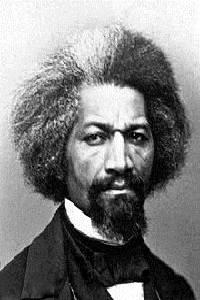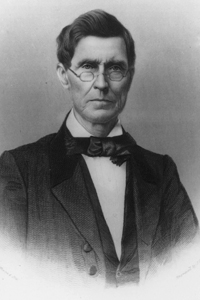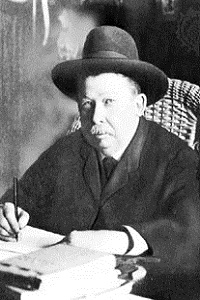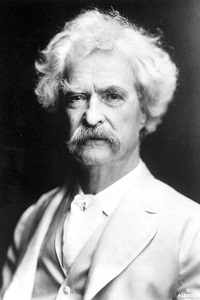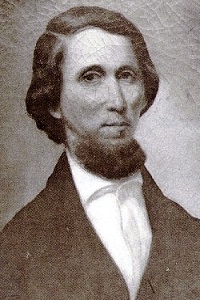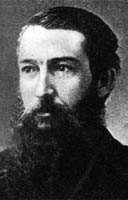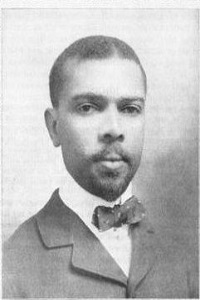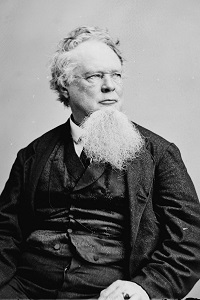The Audio Library of
Classic Southern Literature
1676 to 1923
Made possible by 
Visit our Children's literature site 
Grayling, Chapter 1
Written Text
The world has become monstrous matter-of-fact in latter days. We can no longer get a ghost story, either for love or money. The materialists have it all their own way; and even the little urchin, eight years old, instead of deferring with decent reverence to the opinions of his grandmamma, now stands up stoutly for his own. He believes in every "ology" but pneumatology. "Faust" and the "Old Woman of Berkeley" move his derision only, and he would laugh incredulously, if he dared, at the Witch of Endor. The whole armoury of modern reasoning is on his side; and, however he may admit at seasons that belief can scarcely be counted a matter of will, he yet puts his veto on all sorts of credulity. That cold-blooded demon called Science has taken the place of all the other demons. He has certainly cast out innumerable devils, however he may still spare the principal. Whether we are the better for his intervention is another question. There is reason to apprehend that in disturbing our human faith in shadows, we have lost some of those wholesome moral restraints which might have kept many of us virtuous, where the laws could not. The effect, however, is much the more seriously evil in all that concerns the romantic. Our story-tellers are so resolute to deal in the real, the actual only, that they venture on no subjects the details of which are not equally vulgar and susceptible of proof. With this end in view, indeed, they too commonly choose their subjects among convicted felons, in order that they may avail themselves of the evidence which led to their conviction; and, to prove more conclusively their devoted adherence to nature and the truth, they depict the former not only in her condition of nakedness, but long before she has found out the springs of running water. It is to be feared that some of the coarseness of modern taste arises from the too great lack of that veneration which belonged to, and elevated to dignity, even the errors of preceding ages. A love of the marvelous belongs, it appears to me, to all those who love and cultivate either of the fine arts. I very much doubt whether the poet, the painter, the sculptor, or the romancer, ever yet lived, who had not some strong bias--a leaning, at least,--to a belief in the wonders of the invisible world. Certainly, the higher orders of poets and painters, those who create and invent, must have a strong taint of the superstitious in their composition. But this is digressive, and leads us from our purpose. It is so long since we have been suffered to see or hear of a ghost, that a visitation at this time may have the effect of novelty, and I propose to narrate a story which I heard more than once in my boyhood, from the lips of an aged relative, who succeeded, at the time, in making me believe every
word of it; perhaps, for the simple reason that she convinced me she believed every word of it herself. My grandmother was an old lady who had been a resident of the seat of most frequent war in Carolina during the Revolution. She had fortunately survived the numberless atrocities which she was yet compelled to witness; and, a keen observer, with a strong memory, she had in store a thousand legends of that stirring period, which served to beguile me from sleep many and many a long winter night. The story which I propose to tell was one of these; and when I say that she not only devoutly believed it herself, but that it was believed by sundry of her contemporaries, who were themselves privy to such of the circumstances as could be known to third parties, the gravity with which I repeat the legend will not be considered very astonishing. The revolutionary war had but a little while been concluded. The British had left the country; but peace did not imply repose. The community was still in that state of ferment which was natural enough to passions, not yet at rest, which had been brought into exercise and action during the protracted seven years' struggle through which the nation had just passed. The state was overrun by idlers, adventurers, profligates, and criminals. Disbanded soldiers, half-starved and reckless, occupied the highways,--outlaws, emerging from their hiding-places, skulked about thesettlements with an equal sentiment of hate and fear in their hearts;--patriots were clamouring for justice upon the tories, and sometimes anticipating its course by judgments of their own; while the tories, those against whom the proofs were too strong for denial or evasion, buckled on their armour for a renewal of the struggle. Such being the condition of the country, it may easily be supposed that life and property lacked many of their necessary securities. Men generally travelled with weapons which were displayed on the smallest provocation: and few who could provide themselves with an escort ventured to travel any distance without one. There was, about this time, said my grandmother, and while such was the condition of the country, a family of the name of Grayling, that lived somewhere upon the skirts of "Ninety-six" district. Old Grayling, the head of the family, was dead. He was killed in Buford's massacre. His wife was a fine woman, not so very old, who had an only son named James, and a little girl, only five years of age, named Lucy. James was but fourteen when his father was killed, and that event made a man of him. He went out with his rifle in company with Joel Sparkman, who was his mother's brother, and joined himself to Pickens's Brigade. Here he made as good a soldier as the best. He had no sort of fear. He was always the first to go forward; and his rifle was always good for his enemy's button at a long hundred yards. He was in several fights both with the British and tories; and just before the war was ended he had a famous brush with the Cherokees, when Pickens took their country from them. But though he had no fear, and never knew when to stop killing while the fight was going on, he was the most bashful of boys that I ever knew; and so kind-hearted that it was almost impossible to believe all we heard of his fierce doings when he was in battle. But they were nevertheless quite true for all his bashfulness. Well, when the war was over, Joel Sparkman, who lived with his sister, Grayling, persuaded her that it would be better to move down into the low country. I don't know what reason he had for it, or what they proposed to do there. They had very little property, but Sparkman was a knowing man, who could turn his hand to a hundred things; and as he was a bachelor, and loved his sister and her children just as if they had been his own, it was natural that she should go with him wherever he wished. James, too, who was restless by nature -- and the taste he had enjoyed of the wars had made him more so--he was full of it; and so, one sunny morning in April, their wagon
started for the city. The wagon was only a small one, with two horses, scarcely larger than those that are employed to carry chickens and fruit to the market from the Wassamaws and thereabouts. It was driven by a negro fellow named Clytus, and carried Mrs. Grayling and Lucy. James and his uncle loved the saddle too well to shut themselves up in such a vehicle; and both of them were mounted on fine horses which they had won from the enemy. The saddle that James rode on, -- and he was very proud of it,--was one that he had taken at the battle of Cowpens from one of Tarleton's own dragoons, after he had tumbled the owner. The roads at that season were excessively bad, for the rains of March had been frequent and heavy, the track was very much cut up, and the red clay gullies of the hills of "Ninety-six" were so washed that it required all shoulders, twenty times a day, to get the wagon-wheels out of the bog. This made them travel very slowly,--perhaps, not more than fifteen miles a day. Another cause for slow travelling was, the necessity of great caution, and a constant look-out for enemies both up and down the road. James and his uncle took it by turns to ride a-head, precisely as they did when scouting in war, but one of them always kept along with the wagon. They had gone on this way for two days, and saw nothing to trouble and alarm them. There were few persons on the high-road, and these seemed to the full as shy of them as they probably were of strangers. But just as they were about to camp, the evening of the second day, while they were splitting light-wood, and getting out the kettles and the frying-pan, a person rode up and joined them without much ceremony. He was a short thick-set man, somewhere between forty and fifty: had on very coarse and common garments, though he rode a fine black horse of remarkable strength and vigour. He was very civil of speech, though he had but little to say, and that little showed him to be a person without much education and with no refinement. He begged permission to make one of the encampment, and his manner was very respectful and even humble; but there was something dark and sullen in his face -- his eyes, which were of a light gray colour, were very restless, and his nose turned up sharply, and was very red. His forehead was excessively broad, and his eyebrows thick and shaggy -- white hairs being freely mingled with the dark, both in them and upon his head. Mrs. Grayling did not like this man's looks, and whispered her dislike to her son; but James, who felt himself equal to any man, said, promptly--"What of that, mother! we can't turn the stranger off and say `no;' and if he means any mischief, there's two of us, you know." The man had no weapons--none, at least, which were then visible; and deported himself in so humble a manner, that the prejudice which the party had formed against him when he first appeared, if it was not dissipated while he remained, at least failed to gain any increase. He was very quiet, did not mention an unnecessary word, and seldom permitted his eyes to rest upon those of any of the party, the females not excepted. This, perhaps, was the only circumstance, that, in the mind of Mrs. Grayling, tended to confirm the hostile impression which his coming had originally occasioned. In a little while the temporary encampment was put in a state equally social and warlike. The wagon was wheeled a little way into the woods, and off the road; the horses fastened behind it in such a manner that any attempt to steal them would be difficult of success, even were the watch neglectful which was yet to be maintained upon them. Extra guns, concealed in the straw at the bottom of the wagon, were kept well loaded. In the foreground, and between the wagon and
the highway, a fire was soon blazing with a wild but cheerful gleam; and the worthy dame, Mrs. Grayling, assisted by the little girl, Lucy, lost no time in setting on the frying-pan, and cutting into slices the haunch of bacon, which they had provided at leaving home. James Grayling patrolled the woods, meanwhile for a mile or two round the encampment, while his uncle, Joel Sparkman, foot to foot with the stranger, seemed--if the absence of all care constitutes the supreme of human felicity--to realize the most perfect conception of mortal happiness. But Joel was very far from being the careless person that he seemed. Like an old soldier, he simply hung out false colours, and concealed his real timidity by an extra show of confidence and courage. He did not relish the stranger from the first, any more than his sister; and having subjected him to a searching examination, such as was considered, in those days of peril and suspicion, by no means inconsistent with becoming courtesy, he came rapidly to the conclusion that he was no better than he should be. "You are a Scotchman, stranger," said Joel, suddenly drawing up his feet, and bending forward to the other with an eye like that of a hawk stooping over a covey of partridges. It was a wonder that he had not made the discovery before. The broad dialect of the stranger was not to be subdued; but Joel made slow stages and short progress in his mental journeyings. The answer was given with evident hesitation, but it was affirmative. "Well, now, it's mighty strange that you should ha' fou't with us and not agin us," responded Joel Sparkman. "There was a precious few of the Scotch, and none that I knows on, saving yourself, perhaps,--that didn't go dead agin us, and for the tories, through thick and thin. That `Cross Creek settlement' was a mighty ugly thorn in the sides of us whigs. It turned out a raal bad stock of varmints. I hope,--I reckon, stranger,--you aint from that part." "No," said the other; "oh no! I'm from over the other quarter. I'm from the Duncan settlement above." "I've hearn tell of that other settlement, but I never know'd as any of the men fou't with us. What gineral did you fight under? What Carolina gineral?" "I was at Gum Swamp when General Gates was defeated;" was the still hesitating reply of the other. "Well, I thank God, I warn't there, though I reckon things wouldn't ha' turned out quite so bad, if there had been a leetle sprinkling of Sumter's, or Pickens's, or Marion's men, among them two-legged critters that run that day. They did tell that some of the regiments went off without ever once emptying their rifles. Now, stranger, I hope you warn't among them fellows." "I was not," said the other with something more of promptness. "I don't blame a chap for dodging a bullet if he can, or being too quick for a bagnet, because, I'm thinking, a live man is always a better man than a dead one, or he can become so; but to run without taking a single crack at the inimy, is downright cowardice. There's no two ways about it, stranger." This opinion, delivered with considerable emphasis, met with the ready assent of the Scotchman,
but Joel Sparkman was not to be diverted, even by his own eloquence, from the object of his inquiry. "But you ain't said," he continued, "who was your Carolina gineral. Gates was from Virginny, and he stayed a mighty short time when he come. You didn't run far at Camden, I reckon, and you joined the army ag'in, and come in with Greene? Was that the how?" To this the stranger assented, though with evident disinclination. "Then, mou'tbe, we sometimes went into the same scratch together? I was at Cowpens and Ninety-Six, and seen sarvice at other odds and eends, where there was more fighting than fun. I reckon you must have been at `Ninety-Six,' -- perhaps at Cowpens, too, if you went with Morgan?" The unwillingness of the stranger to respond to these questions appeared to increase. He admitted, however, that he had been at "Ninety-Six," though, as Sparkman afterwards remembered, in this case, as in that of the defeat of Gates at Gum Swamp, he had not said on which side he had fought. Joel, as he discovered the reluctance of his guest to answer his questions, and perceived his growing doggedness, forbore to annoy him, but mentally resolved to keep a sharper look-out than ever upon his motions. His examination concluded with an inquiry, which, in the plain-dealing regions of the south and south-west, is not unfrequently put first. "And what mout be your name, stranger?" "Macnab," was the ready response, "Sandy Macnab." "Well, Mr. Macnab, I see that my sister's got supper ready for us; so we mou't as well fall to upon the hoecake and bacon." Sparkman rose while speaking, and led the way to the spot, near the wagon, where Mrs. Grayling had spread the feast. "We're pretty nigh on to the main road, here, but I reckon there's no great danger now. Besides, Jim Grayling keeps watch for us, and he's got two as good eyes in his head as any scout in the country, and a rifle that, after you once know how it shoots, 'twould do your heart good to hear its crack, if so be that twa'n't your heart that he drawed sight on. He's a perdigious fine shot, and as ready to shoot and fight as if he had a nateral calling that way." "Shall we wait for him before we eat?" demanded Macnab, anxiously. "By no sort o' reason, stranger," answered Sparkman. "He'll watch for us while we're eating, and after that I'll change shoes with him. So fall to, and don't mind what's a coming." Sparkman had just broken the hoecake, when a distant whistle was heard. "Ha! That's the lad now!" he exclaimed, rising to his feet. "He's on trail. He's got a sight of an inimy's fire, I reckon. 'Twon't be onreasonable, friend Macnab, to get our we'pons in readiness;" and, so speaking, Sparkman bid his sister get into the wagon, where the little Lucy had already
placed herself, while he threw open the pan of his rifle, and turned the priming over with his finger. Macnab, meanwhile, had taken from his holsters, which he had before been sitting upon, a pair of horseman's pistols, richly mounted with figures in silver. These were large and long, and had evidently seen service. Unlike his companion, his proceedings occasioned no comment. What he did seemed a matter of habit, of which he himself was scarcely conscious. Having looked at his priming, he laid the instruments beside him without a word, and resumed the bit of hoecake which he had just before received from Sparkman. Meanwhile, the signal whistle, supposed to come from James Grayling, was repeated. Silence ensued then for a brief space, which Sparkman employed in perambulating the grounds immediately contiguous. At length, just as he had returned to the fire, the sound of a horse's feet was heard, and a sharp quick halloo from Grayling informed his uncle that all was right. The youth made his appearance a moment after accompanied by a stranger on horseback; a tall, fine-looking young man, with a keen flashing eye, and a voice whose lively clear tones, as he was heard approaching, sounded cheerily like those of a trumpet after victory. James Grayling kept along on foot beside the new-comer; and his hearty laugh, and free, glib, garrulous tones, betrayed to his uncle, long ere he drew nigh enough to declare the fact, that he had met unexpectedly with a friend, or, at least, an old acquaintance. "Why, who have you got there, James?" was the demand of Sparkman, as he dropped the butt of his rifle upon the ground. "Why, who do you think, uncle? Who but Major Spencer -- our own major?" "You don't say so! -- what! -- well! Li'nel Spencer, for sartin! Lord bless you, major, who'd ha' thought to see you in these parts; and jest mounted too, for all natur, as if the war was to be fou't over ag'in. Well, I'm raal glad to see you. I am, that's sartin!" "And I'm very glad to see you, Sparkman," said the other, as he alighted from his steed, and yielded his hand to the cordial grasp of the other. "Well, I knows that, major, without you saying it. But you've jest come in the right time. The bacon's frying, and here's the bread; -- let's down upon our haunches, in right good airnest, camp fashion, and make the most of what God gives us in the way of blessings. I reckon you don't mean to ride any further to-night, major?" "No," said the person addressed, "not if you'll let me lay my heels at your fire. But who's in your wagon? My old friend, Mrs. Grayling, I suppose?" "That's a true word, major," said the lady herself, making her way out of the vehicle with good-humoured agility, and coming forward with extended hand. "Really, Mrs. Grayling, I'm very glad to see you." And the stranger, with the blandness of a gentleman and the hearty warmth of an old neighbour, expressed his satisfaction at once more finding himself in the company of an old acquaintance. Their greetings once over, Major Spencer readily joined the group about the fire, while James Grayling -- though with some reluctance --
disappeared to resume his toils of the scout while the supper proceeded. "And who have you here?" demanded Spencer, as his eye rested on the dark, hard features of the Scotchman. Sparkman told him all that he himself had learned of the name and character of the stranger, in a brief whisper, and in a moment after formally introduced the parties in this fashion --"Mr. Macnab, Major Spencer. Mr. Macnab says he's true blue, major, and fou't at Camden, when General Gates run so hard to `bring the d -- d militia back.' He also fou't at Ninety-Six, and Cowpens -- so I reckon we had as good as count him one of us." Major Spencer scrutinized the Scotchman keenly -- a scrutiny which the latter seemed very ill to relish. He put a few questions to him on the subject of the war, and some of the actions in which he allowed himself to have been concerned; but his evident reluctance to unfold himself --a reluctance so unnatural to the brave soldier who has gone through his toils honourably -- had the natural effect of discouraging the young officer, whose sense of delicacy had not been materially impaired amid the rude jostlings of military life. But, though he forbore to propose any other questions to Macnab, his eyes continued to survey the features of his sullen countenance with curiosity and a strangely increasing interest. This he subsequently explained to Sparkman, when, at the close of supper, James Grayling came in, and the former assumed the duties of the scout. "I have seen that Scotchman's face somewhere, Sparkman, and I'm convinced at some interesting moment; but where, when, or how, I cannot call to mind. The sight of it is even associated in my mind with something painful and unpleasant; where could I have seen him?" "I don't somehow like his looks myself," said Sparkman, "and I mislists he's been rether more of a tory than a whig; but that's nothing to the purpose now; and he's at our fire, and we've broken hoecake together; so we cannot rake up the old ashes to make a dust with." "No, surely not," was the reply of Spencer. "Even though we knew him to be a tory, that cause of former quarrel should occasion none now. But it should produce watchfulness and caution. I'm glad to see that you have not forgot your old business of scouting in the swamp." "Kin I forget it, major?" demanded Sparkman, in tones which, though whispered, were full of emphasis, as he laid his ear to the earth to listen. "James has finished supper, major -- that's his whistle to tell me so; and I'll jest step back to make it cl'ar to him how we're to keep up the watch to-night." "Count me in your arrangements, Sparkman, as I am one of you for the night," said the major. "By no sort of means," was the reply. "The night must be shared between James and myself. Ef so be you wants to keep company with one or t'other of us, why, that's another thing, and, of course, you can do as you please." "We'll have no quarrel on the subject, Joel," said the officer, good-naturedly, as they returned to the camp together.
………………..
“GRAYLING CHAPTER 1”
By William Gilmore Simms
Read by Tom Turner
Directed by Walter Evans
Copyright Georgia Regents University
2013 All rights reserved
word of it; perhaps, for the simple reason that she convinced me she believed every word of it herself. My grandmother was an old lady who had been a resident of the seat of most frequent war in Carolina during the Revolution. She had fortunately survived the numberless atrocities which she was yet compelled to witness; and, a keen observer, with a strong memory, she had in store a thousand legends of that stirring period, which served to beguile me from sleep many and many a long winter night. The story which I propose to tell was one of these; and when I say that she not only devoutly believed it herself, but that it was believed by sundry of her contemporaries, who were themselves privy to such of the circumstances as could be known to third parties, the gravity with which I repeat the legend will not be considered very astonishing. The revolutionary war had but a little while been concluded. The British had left the country; but peace did not imply repose. The community was still in that state of ferment which was natural enough to passions, not yet at rest, which had been brought into exercise and action during the protracted seven years' struggle through which the nation had just passed. The state was overrun by idlers, adventurers, profligates, and criminals. Disbanded soldiers, half-starved and reckless, occupied the highways,--outlaws, emerging from their hiding-places, skulked about thesettlements with an equal sentiment of hate and fear in their hearts;--patriots were clamouring for justice upon the tories, and sometimes anticipating its course by judgments of their own; while the tories, those against whom the proofs were too strong for denial or evasion, buckled on their armour for a renewal of the struggle. Such being the condition of the country, it may easily be supposed that life and property lacked many of their necessary securities. Men generally travelled with weapons which were displayed on the smallest provocation: and few who could provide themselves with an escort ventured to travel any distance without one. There was, about this time, said my grandmother, and while such was the condition of the country, a family of the name of Grayling, that lived somewhere upon the skirts of "Ninety-six" district. Old Grayling, the head of the family, was dead. He was killed in Buford's massacre. His wife was a fine woman, not so very old, who had an only son named James, and a little girl, only five years of age, named Lucy. James was but fourteen when his father was killed, and that event made a man of him. He went out with his rifle in company with Joel Sparkman, who was his mother's brother, and joined himself to Pickens's Brigade. Here he made as good a soldier as the best. He had no sort of fear. He was always the first to go forward; and his rifle was always good for his enemy's button at a long hundred yards. He was in several fights both with the British and tories; and just before the war was ended he had a famous brush with the Cherokees, when Pickens took their country from them. But though he had no fear, and never knew when to stop killing while the fight was going on, he was the most bashful of boys that I ever knew; and so kind-hearted that it was almost impossible to believe all we heard of his fierce doings when he was in battle. But they were nevertheless quite true for all his bashfulness. Well, when the war was over, Joel Sparkman, who lived with his sister, Grayling, persuaded her that it would be better to move down into the low country. I don't know what reason he had for it, or what they proposed to do there. They had very little property, but Sparkman was a knowing man, who could turn his hand to a hundred things; and as he was a bachelor, and loved his sister and her children just as if they had been his own, it was natural that she should go with him wherever he wished. James, too, who was restless by nature -- and the taste he had enjoyed of the wars had made him more so--he was full of it; and so, one sunny morning in April, their wagon
started for the city. The wagon was only a small one, with two horses, scarcely larger than those that are employed to carry chickens and fruit to the market from the Wassamaws and thereabouts. It was driven by a negro fellow named Clytus, and carried Mrs. Grayling and Lucy. James and his uncle loved the saddle too well to shut themselves up in such a vehicle; and both of them were mounted on fine horses which they had won from the enemy. The saddle that James rode on, -- and he was very proud of it,--was one that he had taken at the battle of Cowpens from one of Tarleton's own dragoons, after he had tumbled the owner. The roads at that season were excessively bad, for the rains of March had been frequent and heavy, the track was very much cut up, and the red clay gullies of the hills of "Ninety-six" were so washed that it required all shoulders, twenty times a day, to get the wagon-wheels out of the bog. This made them travel very slowly,--perhaps, not more than fifteen miles a day. Another cause for slow travelling was, the necessity of great caution, and a constant look-out for enemies both up and down the road. James and his uncle took it by turns to ride a-head, precisely as they did when scouting in war, but one of them always kept along with the wagon. They had gone on this way for two days, and saw nothing to trouble and alarm them. There were few persons on the high-road, and these seemed to the full as shy of them as they probably were of strangers. But just as they were about to camp, the evening of the second day, while they were splitting light-wood, and getting out the kettles and the frying-pan, a person rode up and joined them without much ceremony. He was a short thick-set man, somewhere between forty and fifty: had on very coarse and common garments, though he rode a fine black horse of remarkable strength and vigour. He was very civil of speech, though he had but little to say, and that little showed him to be a person without much education and with no refinement. He begged permission to make one of the encampment, and his manner was very respectful and even humble; but there was something dark and sullen in his face -- his eyes, which were of a light gray colour, were very restless, and his nose turned up sharply, and was very red. His forehead was excessively broad, and his eyebrows thick and shaggy -- white hairs being freely mingled with the dark, both in them and upon his head. Mrs. Grayling did not like this man's looks, and whispered her dislike to her son; but James, who felt himself equal to any man, said, promptly--"What of that, mother! we can't turn the stranger off and say `no;' and if he means any mischief, there's two of us, you know." The man had no weapons--none, at least, which were then visible; and deported himself in so humble a manner, that the prejudice which the party had formed against him when he first appeared, if it was not dissipated while he remained, at least failed to gain any increase. He was very quiet, did not mention an unnecessary word, and seldom permitted his eyes to rest upon those of any of the party, the females not excepted. This, perhaps, was the only circumstance, that, in the mind of Mrs. Grayling, tended to confirm the hostile impression which his coming had originally occasioned. In a little while the temporary encampment was put in a state equally social and warlike. The wagon was wheeled a little way into the woods, and off the road; the horses fastened behind it in such a manner that any attempt to steal them would be difficult of success, even were the watch neglectful which was yet to be maintained upon them. Extra guns, concealed in the straw at the bottom of the wagon, were kept well loaded. In the foreground, and between the wagon and
the highway, a fire was soon blazing with a wild but cheerful gleam; and the worthy dame, Mrs. Grayling, assisted by the little girl, Lucy, lost no time in setting on the frying-pan, and cutting into slices the haunch of bacon, which they had provided at leaving home. James Grayling patrolled the woods, meanwhile for a mile or two round the encampment, while his uncle, Joel Sparkman, foot to foot with the stranger, seemed--if the absence of all care constitutes the supreme of human felicity--to realize the most perfect conception of mortal happiness. But Joel was very far from being the careless person that he seemed. Like an old soldier, he simply hung out false colours, and concealed his real timidity by an extra show of confidence and courage. He did not relish the stranger from the first, any more than his sister; and having subjected him to a searching examination, such as was considered, in those days of peril and suspicion, by no means inconsistent with becoming courtesy, he came rapidly to the conclusion that he was no better than he should be. "You are a Scotchman, stranger," said Joel, suddenly drawing up his feet, and bending forward to the other with an eye like that of a hawk stooping over a covey of partridges. It was a wonder that he had not made the discovery before. The broad dialect of the stranger was not to be subdued; but Joel made slow stages and short progress in his mental journeyings. The answer was given with evident hesitation, but it was affirmative. "Well, now, it's mighty strange that you should ha' fou't with us and not agin us," responded Joel Sparkman. "There was a precious few of the Scotch, and none that I knows on, saving yourself, perhaps,--that didn't go dead agin us, and for the tories, through thick and thin. That `Cross Creek settlement' was a mighty ugly thorn in the sides of us whigs. It turned out a raal bad stock of varmints. I hope,--I reckon, stranger,--you aint from that part." "No," said the other; "oh no! I'm from over the other quarter. I'm from the Duncan settlement above." "I've hearn tell of that other settlement, but I never know'd as any of the men fou't with us. What gineral did you fight under? What Carolina gineral?" "I was at Gum Swamp when General Gates was defeated;" was the still hesitating reply of the other. "Well, I thank God, I warn't there, though I reckon things wouldn't ha' turned out quite so bad, if there had been a leetle sprinkling of Sumter's, or Pickens's, or Marion's men, among them two-legged critters that run that day. They did tell that some of the regiments went off without ever once emptying their rifles. Now, stranger, I hope you warn't among them fellows." "I was not," said the other with something more of promptness. "I don't blame a chap for dodging a bullet if he can, or being too quick for a bagnet, because, I'm thinking, a live man is always a better man than a dead one, or he can become so; but to run without taking a single crack at the inimy, is downright cowardice. There's no two ways about it, stranger." This opinion, delivered with considerable emphasis, met with the ready assent of the Scotchman,
but Joel Sparkman was not to be diverted, even by his own eloquence, from the object of his inquiry. "But you ain't said," he continued, "who was your Carolina gineral. Gates was from Virginny, and he stayed a mighty short time when he come. You didn't run far at Camden, I reckon, and you joined the army ag'in, and come in with Greene? Was that the how?" To this the stranger assented, though with evident disinclination. "Then, mou'tbe, we sometimes went into the same scratch together? I was at Cowpens and Ninety-Six, and seen sarvice at other odds and eends, where there was more fighting than fun. I reckon you must have been at `Ninety-Six,' -- perhaps at Cowpens, too, if you went with Morgan?" The unwillingness of the stranger to respond to these questions appeared to increase. He admitted, however, that he had been at "Ninety-Six," though, as Sparkman afterwards remembered, in this case, as in that of the defeat of Gates at Gum Swamp, he had not said on which side he had fought. Joel, as he discovered the reluctance of his guest to answer his questions, and perceived his growing doggedness, forbore to annoy him, but mentally resolved to keep a sharper look-out than ever upon his motions. His examination concluded with an inquiry, which, in the plain-dealing regions of the south and south-west, is not unfrequently put first. "And what mout be your name, stranger?" "Macnab," was the ready response, "Sandy Macnab." "Well, Mr. Macnab, I see that my sister's got supper ready for us; so we mou't as well fall to upon the hoecake and bacon." Sparkman rose while speaking, and led the way to the spot, near the wagon, where Mrs. Grayling had spread the feast. "We're pretty nigh on to the main road, here, but I reckon there's no great danger now. Besides, Jim Grayling keeps watch for us, and he's got two as good eyes in his head as any scout in the country, and a rifle that, after you once know how it shoots, 'twould do your heart good to hear its crack, if so be that twa'n't your heart that he drawed sight on. He's a perdigious fine shot, and as ready to shoot and fight as if he had a nateral calling that way." "Shall we wait for him before we eat?" demanded Macnab, anxiously. "By no sort o' reason, stranger," answered Sparkman. "He'll watch for us while we're eating, and after that I'll change shoes with him. So fall to, and don't mind what's a coming." Sparkman had just broken the hoecake, when a distant whistle was heard. "Ha! That's the lad now!" he exclaimed, rising to his feet. "He's on trail. He's got a sight of an inimy's fire, I reckon. 'Twon't be onreasonable, friend Macnab, to get our we'pons in readiness;" and, so speaking, Sparkman bid his sister get into the wagon, where the little Lucy had already
placed herself, while he threw open the pan of his rifle, and turned the priming over with his finger. Macnab, meanwhile, had taken from his holsters, which he had before been sitting upon, a pair of horseman's pistols, richly mounted with figures in silver. These were large and long, and had evidently seen service. Unlike his companion, his proceedings occasioned no comment. What he did seemed a matter of habit, of which he himself was scarcely conscious. Having looked at his priming, he laid the instruments beside him without a word, and resumed the bit of hoecake which he had just before received from Sparkman. Meanwhile, the signal whistle, supposed to come from James Grayling, was repeated. Silence ensued then for a brief space, which Sparkman employed in perambulating the grounds immediately contiguous. At length, just as he had returned to the fire, the sound of a horse's feet was heard, and a sharp quick halloo from Grayling informed his uncle that all was right. The youth made his appearance a moment after accompanied by a stranger on horseback; a tall, fine-looking young man, with a keen flashing eye, and a voice whose lively clear tones, as he was heard approaching, sounded cheerily like those of a trumpet after victory. James Grayling kept along on foot beside the new-comer; and his hearty laugh, and free, glib, garrulous tones, betrayed to his uncle, long ere he drew nigh enough to declare the fact, that he had met unexpectedly with a friend, or, at least, an old acquaintance. "Why, who have you got there, James?" was the demand of Sparkman, as he dropped the butt of his rifle upon the ground. "Why, who do you think, uncle? Who but Major Spencer -- our own major?" "You don't say so! -- what! -- well! Li'nel Spencer, for sartin! Lord bless you, major, who'd ha' thought to see you in these parts; and jest mounted too, for all natur, as if the war was to be fou't over ag'in. Well, I'm raal glad to see you. I am, that's sartin!" "And I'm very glad to see you, Sparkman," said the other, as he alighted from his steed, and yielded his hand to the cordial grasp of the other. "Well, I knows that, major, without you saying it. But you've jest come in the right time. The bacon's frying, and here's the bread; -- let's down upon our haunches, in right good airnest, camp fashion, and make the most of what God gives us in the way of blessings. I reckon you don't mean to ride any further to-night, major?" "No," said the person addressed, "not if you'll let me lay my heels at your fire. But who's in your wagon? My old friend, Mrs. Grayling, I suppose?" "That's a true word, major," said the lady herself, making her way out of the vehicle with good-humoured agility, and coming forward with extended hand. "Really, Mrs. Grayling, I'm very glad to see you." And the stranger, with the blandness of a gentleman and the hearty warmth of an old neighbour, expressed his satisfaction at once more finding himself in the company of an old acquaintance. Their greetings once over, Major Spencer readily joined the group about the fire, while James Grayling -- though with some reluctance --
disappeared to resume his toils of the scout while the supper proceeded. "And who have you here?" demanded Spencer, as his eye rested on the dark, hard features of the Scotchman. Sparkman told him all that he himself had learned of the name and character of the stranger, in a brief whisper, and in a moment after formally introduced the parties in this fashion --"Mr. Macnab, Major Spencer. Mr. Macnab says he's true blue, major, and fou't at Camden, when General Gates run so hard to `bring the d -- d militia back.' He also fou't at Ninety-Six, and Cowpens -- so I reckon we had as good as count him one of us." Major Spencer scrutinized the Scotchman keenly -- a scrutiny which the latter seemed very ill to relish. He put a few questions to him on the subject of the war, and some of the actions in which he allowed himself to have been concerned; but his evident reluctance to unfold himself --a reluctance so unnatural to the brave soldier who has gone through his toils honourably -- had the natural effect of discouraging the young officer, whose sense of delicacy had not been materially impaired amid the rude jostlings of military life. But, though he forbore to propose any other questions to Macnab, his eyes continued to survey the features of his sullen countenance with curiosity and a strangely increasing interest. This he subsequently explained to Sparkman, when, at the close of supper, James Grayling came in, and the former assumed the duties of the scout. "I have seen that Scotchman's face somewhere, Sparkman, and I'm convinced at some interesting moment; but where, when, or how, I cannot call to mind. The sight of it is even associated in my mind with something painful and unpleasant; where could I have seen him?" "I don't somehow like his looks myself," said Sparkman, "and I mislists he's been rether more of a tory than a whig; but that's nothing to the purpose now; and he's at our fire, and we've broken hoecake together; so we cannot rake up the old ashes to make a dust with." "No, surely not," was the reply of Spencer. "Even though we knew him to be a tory, that cause of former quarrel should occasion none now. But it should produce watchfulness and caution. I'm glad to see that you have not forgot your old business of scouting in the swamp." "Kin I forget it, major?" demanded Sparkman, in tones which, though whispered, were full of emphasis, as he laid his ear to the earth to listen. "James has finished supper, major -- that's his whistle to tell me so; and I'll jest step back to make it cl'ar to him how we're to keep up the watch to-night." "Count me in your arrangements, Sparkman, as I am one of you for the night," said the major. "By no sort of means," was the reply. "The night must be shared between James and myself. Ef so be you wants to keep company with one or t'other of us, why, that's another thing, and, of course, you can do as you please." "We'll have no quarrel on the subject, Joel," said the officer, good-naturedly, as they returned to the camp together.
………………..
“GRAYLING CHAPTER 1”
By William Gilmore Simms
Read by Tom Turner
Directed by Walter Evans
Copyright Georgia Regents University
2013 All rights reserved
